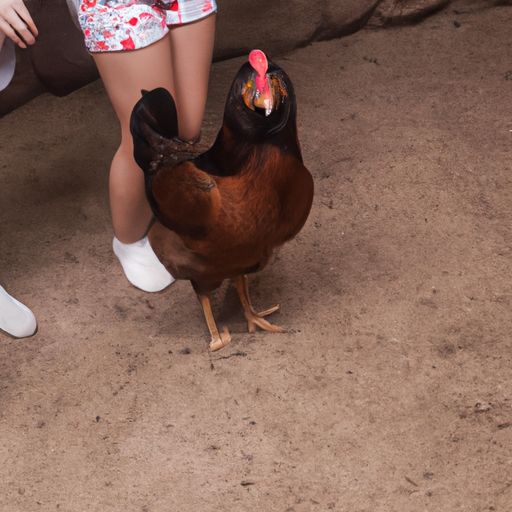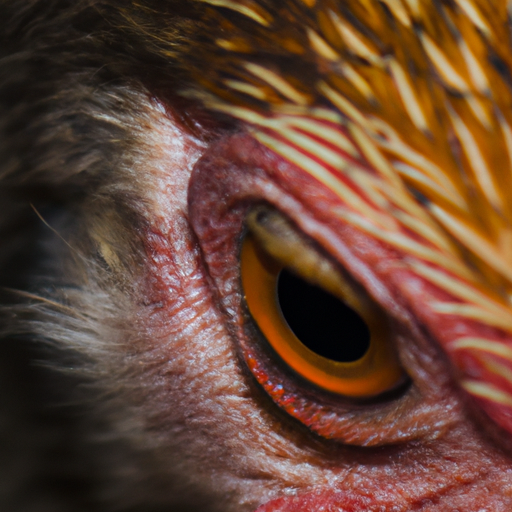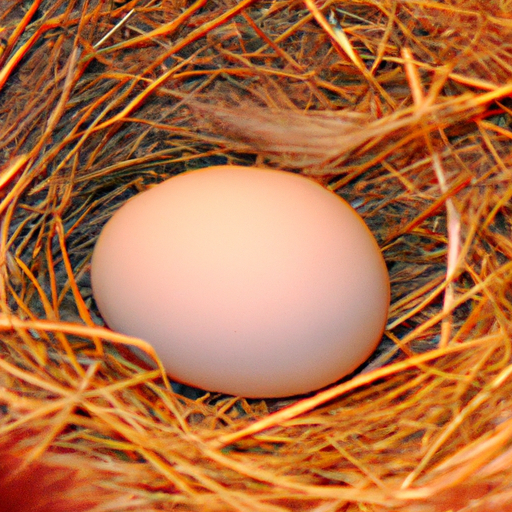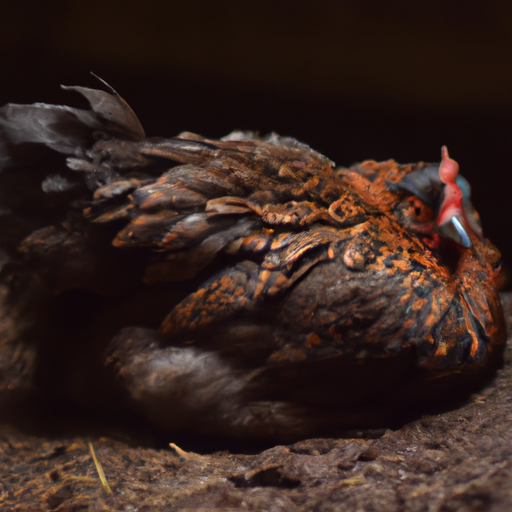Have you ever wondered about the social lives of chickens? It turns out that these feathered creatures are not immune to feelings of loneliness and social issues. Many signs can indicate when a chicken is experiencing isolation or struggling in social situations. By recognizing these signs, we can better understand the complex social dynamics of these birds and take steps to ensure their well-being. So, let’s dive into the fascinating world of chicken socialization and explore the signs of loneliness or social issues that they may exhibit.
Signs of Loneliness or Social Issues Among Chickens
Chickens, like many social creatures, thrive in the company of their flock. They are highly social animals that rely on social interactions for their overall well-being. However, just like humans, chickens can also experience loneliness or social issues that can greatly impact their health and happiness. In this article, we will explore the various signs that indicate loneliness or social problems among chickens, helping you better understand and address these issues to ensure the welfare of your feathered friends.
Lack of Social Interaction
Isolation from Other Chickens
One of the most evident signs of loneliness or social issues among chickens is their isolation from other members of their flock. Lonely chickens often distance themselves from the group, choosing to stand or roost alone instead of engaging in social activities with their fellow chickens. They may seek out secluded spots in the coop or yard, avoiding interaction as much as possible.
Avoidance of Group Activities
Chickens that are experiencing social issues may also show a reluctance to participate in group activities. They may refuse to join their flockmates in foraging or dust-bathing sessions, preferring to keep to themselves instead. This withdrawal from group activities is a clear indication that the chicken is not feeling socially fulfilled.
Withdrawal from Flock
Another sign of loneliness or social issues among chickens is their withdrawal from the flock. Chickens that are feeling isolated or excluded may choose to stay away from the group, distancing themselves physically and emotionally. They may spend more time away from the coop and engage in solitary activities, such as pacing or pecking at the ground, further emphasizing their sense of loneliness.
Reduced Vocalization
A chicken’s vocalizations play a crucial role in their social interactions. When a chicken becomes lonely or socially deprived, they may exhibit a decrease in vocalization. Instead of engaging in typical clucking and chirping, they may remain silent or emit softer, less frequent calls. This lack of vocalization is a telling sign of their dissatisfaction with their social environment.
Aggressive Behavior
Pecking and Bullying
Loneliness and social issues can often lead to aggressive behavior in chickens. When they lack positive social interactions, they may resort to pecking and bullying other flock members. This aggressive behavior can manifest in relentless pursuit, chasing, and attacking other chickens, establishing a hierarchical dominance within the flock.
Fighting for Dominance
Chickens experiencing social issues may engage in frequent fights with other flock members as they compete for dominance. These fights can be intense, often resulting in injuries or wounds on the chickens involved. The need to establish dominance becomes more pronounced when chickens lack the appropriate social interactions and hierarchies within their flock.
Excessive Aggression Toward Other Chickens
A socially deprived chicken may display excessive aggression towards other chickens, even without the presence of a direct threat or conflict. They may lash out at their flockmates with heightened intensity, taking out their frustration and loneliness on their fellow birds. This increased aggression can disrupt the overall harmony within the flock and result in a hostile environment for all chickens involved.
Increased Incidence of Injuries
As a consequence of their aggressive behavior, socially deprived chickens are more likely to sustain injuries. Fights and physical altercations become more prevalent, increasing the chances of cuts, bruises, and puncture wounds among flock members. These injuries not only compromise the physical well-being of the chickens but also further exacerbate their social issues.
Excessive Feather Pecking
Targeting Feathers of Other Chickens
Another sign of loneliness or social issues among chickens is excessive feather pecking. Chickens that lack social stimulation may redirect their frustration by continuously pecking at the feathers of their flockmates. This behavior can be seen as an outlet for their pent-up emotions, using the feathers of other chickens as a means of release.
Naked Neck or Vent Area
When a chicken engages in excessive feather pecking, it can result in specific areas of the body becoming bald or exposed. The neck and vent area are typically the prime targets, with feathers being plucked out repeatedly due to the chicken’s anxious or frustrated behavior. This nakedness is a visible sign of the underlying social issues that the chicken is experiencing.
Damaged or Injured Skin
As feather pecking intensifies, the skin underneath the targeted area can become damaged or injured. Continuous pecking and pulling at the feathers can lead to lacerations, abrasions, or open wounds on the chicken’s skin. These injuries not only cause physical pain and discomfort but also make the chicken more vulnerable to infections or other health complications.
Feather Loss
One of the most evident signs of excessive feather pecking due to social issues is the significant loss of feathers. Feather loss can occur not only in the targeted areas but also throughout the chicken’s body. The constant pecking and biting at feathers disrupt the normal regrowth process, leading to patchy or even complete feather loss. This feather loss not only affects the chicken’s appearance but also serves as a visible reminder of their social struggles.
Reduced Egg Production
Fewer or No Eggs Laid
For chickens, egg-laying is an essential aspect of their reproductive behavior. However, when they are experiencing loneliness or social issues, their egg production can be significantly affected. A lonely chicken may lay fewer eggs than usual or, in severe cases, stop laying eggs altogether. This decline in egg production is a clear indication of their unhappiness and dissatisfaction with their social environment.
Abnormal Egg Size or Shape
In addition to reduced egg production, socially deprived chickens may also lay eggs that deviate from the norm in terms of size or shape. These abnormal eggs can be larger or smaller than the standard size or have irregular shapes and textures. The stress and anxiety resulting from their social issues can disrupt the normal reproductive processes, leading to such abnormal variations.
Early Ceasing of Laying
Chickens that are socially deprived may also exhibit an early cessation of egg-laying. Typically, chickens will continue laying eggs for a specific period before reaching a natural decline in egg production due to age or other factors. However, lonely chickens may stop laying eggs prematurely, further emphasizing the negative impact of their social environment on their reproductive behavior.
Delayed or Stunted Development of Reproductive System
The reproductive system of chickens is greatly influenced by their social interactions and well-being. Socially deprived chickens may experience delayed or stunted development of their reproductive systems, resulting in a prolonged immaturity or underdevelopment of their ovaries and other reproductive organs. This delay or stunted growth can affect their overall reproductive performance, including egg production.
Weight Loss
Loss of Appetite
Lonely or socially deprived chickens may experience a loss of appetite, leading to weight loss. The emotional distress caused by their social issues can greatly impact their desire to eat, resulting in a decreased food intake. This significant decrease in appetite can cause the chicken to become malnourished and lose weight over time.
Reduced Nutrient Absorption
When a chicken is feeling lonely or socially isolated, their body’s ability to absorb nutrients can be compromised. Stress and anxiety can negatively impact their digestive system, hindering the absorption of essential nutrients from their feed. As a result, even if they are consuming an adequate amount of food, their body may fail to obtain the necessary nutrients, leading to weight loss.
Muscle Wasting
Weight loss due to social issues can also result in muscle wasting. Chickens that lack social interaction and adequate nutrition may experience a breakdown of their muscle tissue, leading to a decrease in both muscle mass and overall strength. This muscle wasting is often visible in their body composition, with a noticeable loss of muscle tone and definition.
Visible Ribs or Prominent Breastbone
As weight loss progresses, the chicken’s skeletal structure becomes more prominent. Visible ribs and a prominent breastbone are common indicators of significant weight loss due to social issues among chickens. These physical manifestations highlight the gravity of the problem, reflecting the toll that loneliness can take on a chicken’s overall health and body condition.
Depression-Like Symptoms
Lethargy
Chickens experiencing social issues may exhibit lethargy as a prominent sign of their emotional distress. They may show a lack of energy or motivation, tending to remain stationary for prolonged periods instead of engaging in their usual activities. This lethargy can manifest as a loss of interest in exploring the environment, foraging for food, or interacting with other flock members.
Avoidance of Social Interactions
Depressed chickens may actively avoid social interactions with their flockmates, further intensifying their feelings of loneliness and isolation. They may choose to hide away in secluded corners rather than engage in bonding activities with their fellow chickens. This avoidance of social interactions is a clear indication of their disinterest in maintaining relationships within the flock.
Decreased Vocalization
Similar to their lack of vocalization mentioned earlier, chickens experiencing social issues may exhibit a decrease in their overall vocal activity. They may refrain from clucking, chirping, or other vocalizations that are typical of their species. This decreased vocalization further emphasizes their emotional withdrawal and lack of engagement with their social environment.
Decreased Preening or Self-Grooming
Chickens suffering from social issues may exhibit a decreased inclination to engage in preening or self-grooming behaviors. Preening is not only crucial for maintaining feather health but also serves as a social bonding activity within the flock. A decrease in preening behavior indicates a lack of interest in self-care and a reduced desire to connect with other chickens.
Increased Mortality
Higher Death Rates in Lonely Chickens
Loneliness and social issues can have severe consequences on a chicken’s overall health and well-being, often resulting in higher mortality rates. The emotional distress and physical effects of loneliness can weaken a chicken’s immune system, making them more vulnerable to diseases and other health complications, ultimately leading to a higher likelihood of premature death.
Susceptibility to Diseases
Lonely chickens are more susceptible to diseases due to their compromised immune systems. The stress and anxiety resulting from social issues can suppress their immune responses, making them more susceptible to infections, parasites, and other pathogens. Their reduced ability to fight off diseases further escalates their vulnerability and increases the risk of mortality.
Weakened Immune System
Socially deprived chickens often experience a weakened immune system as a consequence of their loneliness. The chronic stress and emotional strain of their social issues can diminish the effectiveness of their immune responses, leaving them more susceptible to infections and diseases. A compromised immune system not only increases their mortality risk but also hampers their ability to recover from illnesses and injuries.
Higher Incidence of Disease
Weakened Immunity
Loneliness and social issues can significantly weaken a chicken’s immune system, making them more susceptible to diseases. Chronic stress and emotional distress compromise the body’s ability to mount appropriate immune responses against pathogens, leaving the chicken more vulnerable to infections and illnesses. This weakened immunity can make even simple infections more severe and debilitating for socially deprived chickens.
Increased Stress Levels
Lonely chickens constantly experience elevated levels of stress due to their social issues. Stress hormones, such as cortisol, can build up in their bodies, negatively impacting their overall health and well-being. Chronic stress not only weakens their immune system but also contributes to a range of physiological and behavioral abnormalities that further compromise their overall health.
Lower Resistance to Pathogens
Loneliness and social issues can reduce a chicken’s resistance to various pathogens and disease-causing agents. Without adequate social interactions and positive stimulation, their immune system becomes less efficient at identifying and neutralizing pathogens. As a result, they become more susceptible to infections, parasites, and other disease-causing agents that can further erode their health.
Slower Recovery from Illness
When chickens face social issues, their ability to recover from illnesses or injuries can be significantly compromised. Without the emotional support and social interactions necessary for a swift recovery, their healing process may be slower and less effective. This prolonged recovery period can further exacerbate their vulnerability to additional health complications, leading to a negative cycle of illness and reduced well-being.
Abnormal Behavior
Pacing or Circling
Lonely chickens may exhibit abnormal behaviors such as pacing or circling in their environment. This repetitive and purposeless movement can be seen as an outlet for their pent-up emotions and frustration. Pacing or circling behaviors are clear signs of their need for increased social interactions and environmental enrichment.
Head Bobbing or Shaking
Head bobbing or shaking is another abnormal behavior that can be observed in lonely chickens. This behavior is often associated with heightened stress or anxiety, with chickens repeatedly bobbing or shaking their heads as a physical manifestation of their emotional distress. It serves as a visible reminder of their struggle with their social environment.
Self-Harming Behavior
In severe cases of loneliness or social issues, chickens may exhibit self-harming behaviors. They may peck at their own feathers or body, causing self-inflicted injuries and wounds. This self-harming behavior is a clear indication of their extreme emotional distress and desperation for any form of stimulation or relief from their loneliness.
Repetitive or Stereotypic Actions
Socially deprived chickens may engage in repetitive or stereotypic actions as a means to cope with their social issues. These actions can include excessive pecking, pacing, or head movements that are performed repeatedly and without any apparent purpose. These repetitive behaviors are often a result of their boredom, frustration, and lack of mental stimulation.
In conclusion, chickens are highly social animals that require adequate social interactions to thrive. Loneliness and social issues can have significant negative impacts on their overall well-being, leading to a range of physical, behavioral, and emotional signs. As responsible chicken keepers, it is important for us to recognize and address these signs to ensure the happiness and welfare of our feathered friends. By understanding the signs of loneliness or social issues among chickens, we can take proactive steps to provide them with the social stimulation and positive interactions they need, ultimately improving their quality of life.




